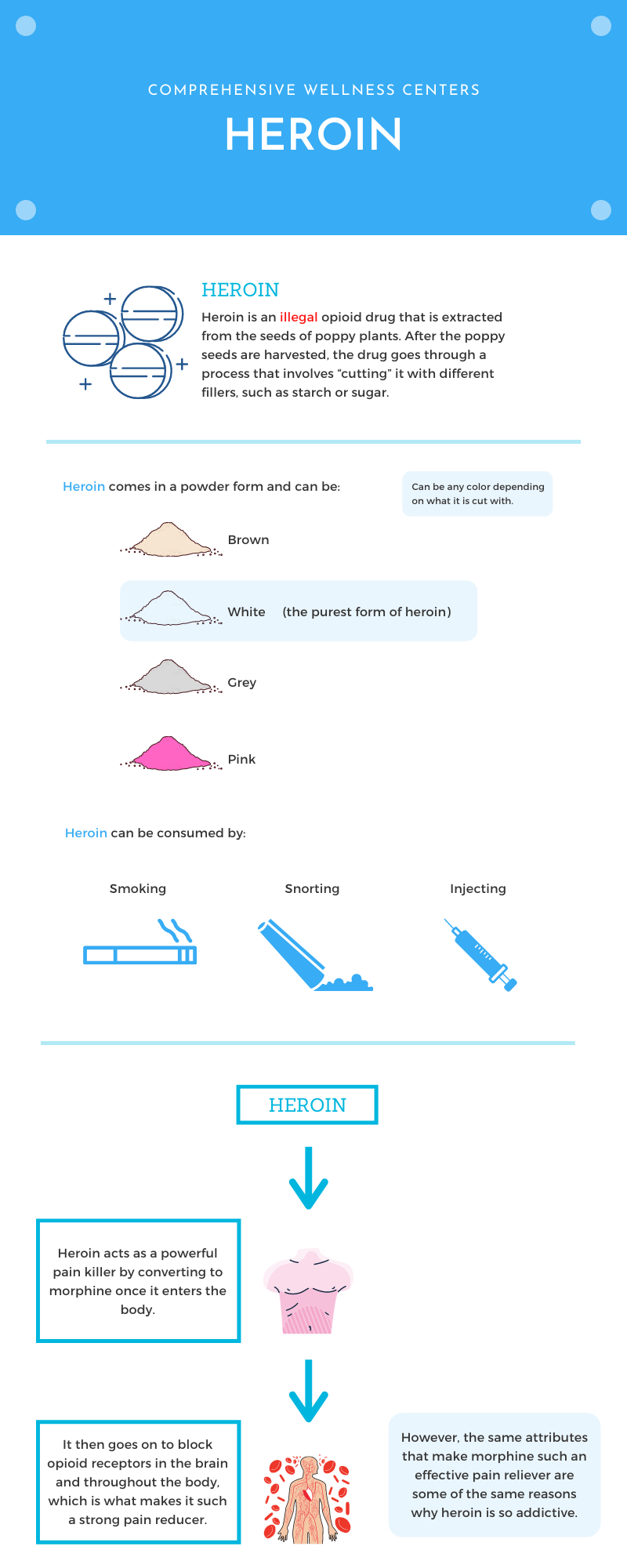When people think of addiction, one of the first drugs that come to mind is heroin. This suggests that heroin is one of the most powerful and addictive drugs out there. So, why exactly is heroin so addictive?
There are several factors that determine how addictive a drug is. These factors include the drug’s effects on brain chemistry, how it makes them feel physically, and whether or not it is easy to acquire. In the case of heroin, this drug hits the trifecta for all three categories making it one of the most addictive and most dangerous drugs. Let’s take a deeper look into what makes heroin so addictive.
What is Heroin?
Heroin is an illegal opioid drug that is extracted from the seeds of poppy plants. After the poppy seeds are harvested, the drug goes through a process that involves “cutting” it with different fillers, such as starch or sugar. Heroin comes in a powder form and can be brown, white, grey, or even pink in color depending on what it is cut with. However, the purest form of heroin is a white powder. Heroin is smoked, snorted, or injected intravenously. [1] Heroin acts as a powerful pain killer by converting to morphine once it enters the body. It then goes on to block opioid receptors in the brain and throughout the body, which is what makes it such a strong pain reducer.[2] However, the same attributes that make morphine such an effective pain reliever are some of the same reasons why heroin is so addictive.

Heroin and Brain Chemistry
Addiction is twofold, in that a person who is suffering from substance use disorder becomes both physically and mentally addicted. This is due to the chemical changes that occur in the brain when someone takes an addictive drug such as heroin. These chemical changes have long-lasting effects on the brain and the body.
Heroin acts by binding to opioid receptors, subsequently activating them. These receptors are typically activated by naturally occurring chemicals in the brain known as neurotransmitters. Neurotransmitters activating opioid receptors are associated with reduced pain levels, reduced stress, a slow down in motor functions, and overall pleasant feelings. As a result, drug abuse is further reinforced by the increased production of dopamine when opioid receptors are activated. As someone continues to abuse heroin, the brain and the body becomes used to having these receptors artificially stimulated. The high levels of dopamine, which activates the brain’s reward center, further reinforce the continued use of heroin, making it so addictive. [3]
Heroin Tolerance
The artificial stimulation of opioid receptors eventually results in a phenomenon known as tolerance. This occurs when someone continues to abuse a drug and eventually gets the brain and body accustomed to having it.[4] This essentially makes the brain “lazy” when it comes to producing its own natural source of neurotransmitters. Consequently, someone suffering from heroin addiction will need to continually use more of the drug to get the same desired outcome of pain reduction and feelings of well-being.
Once tolerance is established, this means that a person is most likely physically dependent on heroin. When someone is physically dependent on a drug they will begin to experience withdrawal symptoms after a period of time without it. The extreme discomfort that a person with heroin addiction experiences during withdrawal causes them to continue to abuse the drug to avoid feeling them. Heroin withdrawal symptoms include:
- Nausea
- Diarrhea
- Insomnia
- Agitation or Irritability
- Pain [4]
These uncomfortable withdrawal symptoms are one of the primary reasons why heroin is so addictive and so difficult to stop.
Physical Effects of Heroin
The pleasant side effects produced by short-term heroin use are a huge contributor as to why the drug is so addictive. People will often continue to abuse heroin in the pursuit of feeling that “first high” again. The pain-relieving abilities produced by activation of the opioid receptors along with the feel-good effects of increased dopamine levels make it a very alluring drug for many people.
The methods of heroin abuse also facilitate a rapid reaction in the body. Smoking, snorting, or injecting heroin all deliver the drug directly to the brain as quickly as possible. That means those pleasant side effects are almost immediate. This instant gratification that is associated with heroin abuse is an added reason as to why the addiction rate is so high among heroin users.
Heroin Availability
Although heroin is illegal, it is found in cities and towns all across the United States. Over 900,000 Americans admitted to using heroin in 2016.[5] Its easy accessibility is another driving factor of what makes heroin so addictive. People are able to get it easily and at any time of the day making it readily available for abuse. Not only that, but the United States is still in the midst of a prescription opioid epidemic. Many people who were once addicted to prescription opioids have graduated on to using heroin, instead.
Getting Help for Heroin Addiction
It is extremely difficult to recover from heroin addiction and may even seem impossible. However, with the right tools and support system, anyone can be on the road to recovery in no time. Our accredited drug and alcohol treatment center in South Florida can help put you on the right path. Our team of addiction counselors works closely with you to develop a comprehensive treatment plan that fits your unique needs. If you or a loved one is addicted to heroin, contact us today to see how we can help you take back control over your life.
- https://www.drugabuse.gov/publications/research-reports/heroin/what-heroin
- https://www.drugabuse.gov/publications/research-reports/heroin/what-are-immediate-short-term-effects-heroin-use
- https://www.drugabuse.gov/publications/research-reports/heroin/effects-of-heroin-on-body
- https://www.drugabuse.gov/publications/research-reports/heroin/what-are-long-term-effects-heroin-use
- https://www.drugabuse.gov/publications/research-reports/heroin/scope-heroin-use-in-united-states













